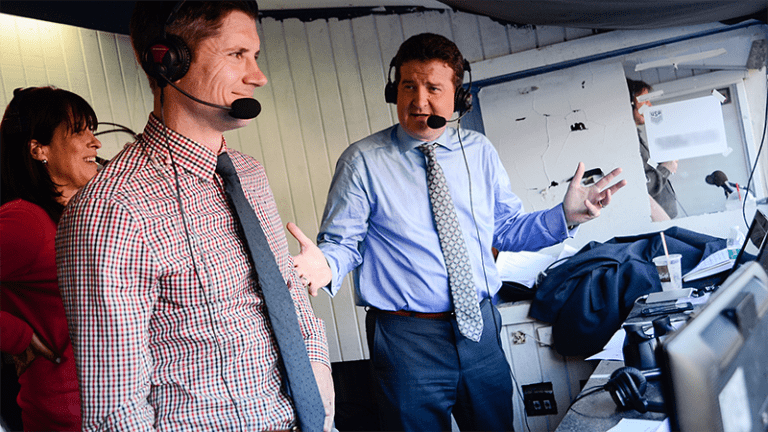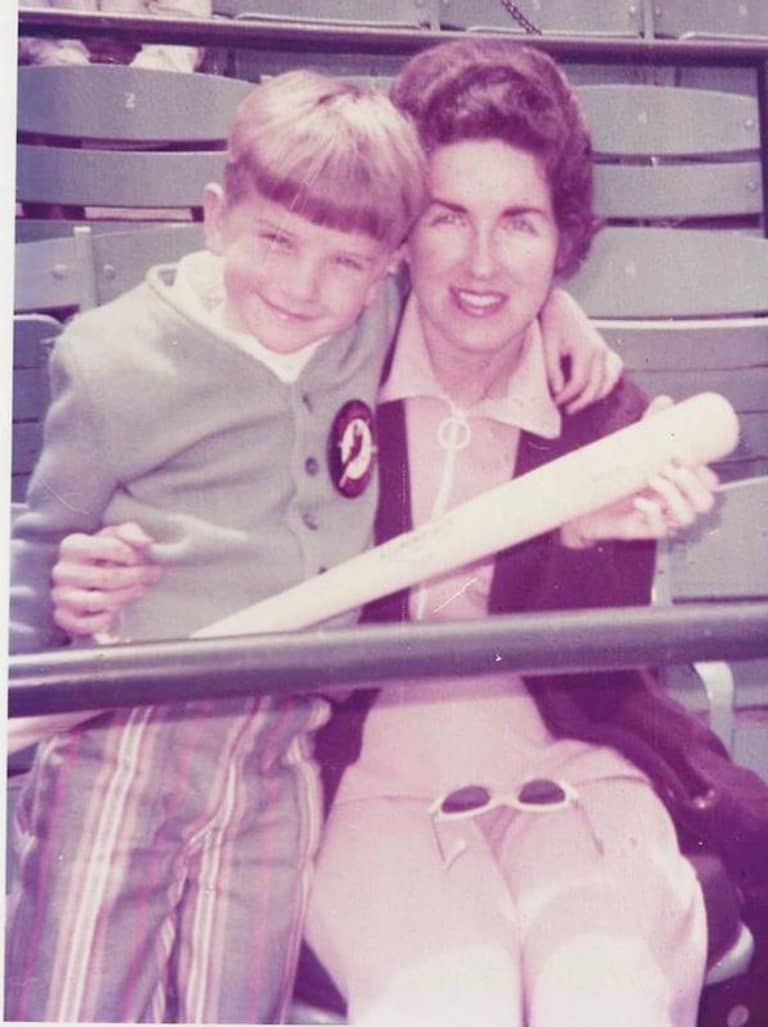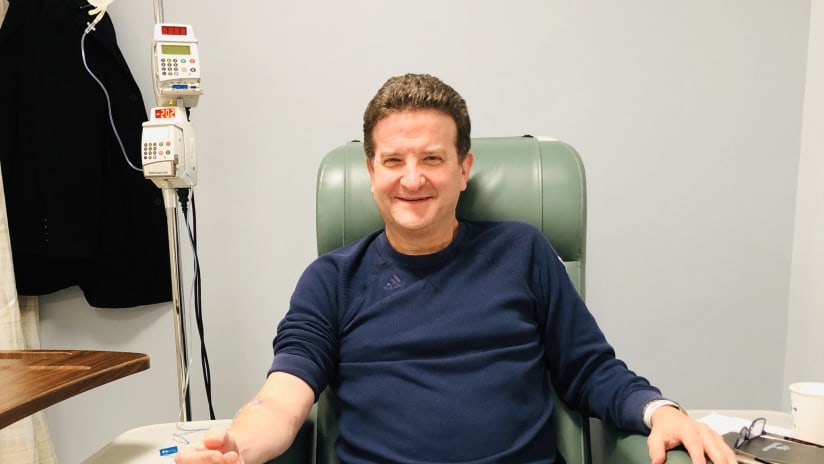Dave Johnson’s right hand looks like his mom’s.
Dave Johnson has been the play-by-play broadcaster for D.C. United since day one, and his right hand looks like his mom’s. That’s what you need to know for this story. There’s the tie-in to MLS and there’s the hook if you were wanting it.
Johnson has Multiple Sclerosis, a disease that affects about 400,000 people in the United States and 2.5 million people worldwide. He’s had it for almost a year to the day. It’s a disease that attacks you from the inside. The immune system doesn’t cooperate with the central nervous system — your brain, spinal cord and optic nerves — and it can lead to fatigue, cognitive issues and body parts simply not working. To be exact, Johnson has one of four types of MS called Primary Progressive MS. In short, that means the disease is not going away and it means the disabilities that come from it will get worse over time.
“It’s a claustrophobic disease,” Johnson told MLSsoccer.com in a recent interview. “It's the inside of your body that's attacking you. They tell you that you have lesions inside your brain and your spine. It’s like you want to just be able to say “Get out of there” and wash them all off, but you can’t.”
Almost exactly a year ago, Johnson noticed the right side of his body. It’s never a good thing when you notice different sides of your body. It means that one side must be doing something different from the other. In this case, his right side was … well, it’s hard to describe. From the outside it sounds like both sides were split in half with the left side operating on 100% battery power and the other slowly losing its charge. Johnson chalked it up to lack of sleep, an old knee injury and the cross-country travel schedule of a broadcaster.

Dave Johnson during one of the hundreds of D.C. United games he has called since the team launched in 1996. | Courtesy of D.C. United
Doctors took an MRI. They agreed the knee had its issues, but they were more concerned about his neck and spine. They sent him to a neurologist. Then to an MS specialist. Johnson floated from appointment to appointment and 10 MRIs, a spinal tap and more. Then the doctors confirmed it. Johnson had MS.
That’s frightening to hear. Especially when you’ve already seen the unstoppable bomb exploding in slow motion inside of you up close before. Or at least its effects.
For as long as Johnson can remember his mom lived life in a wheelchair. A former figure skater, MS moved her into a wheelchair shortly after Dave came into the world. She still did what she had to, though, to take care of her family. Even if that meant listening to an 8-year-old Dave broadcast games neither of them could see.
“She was a wonderful mother and the relationship I have with her was extremely close,” he said. “I would come up in school and take care of her and she was my person I would broadcast to. There was no internet or whatever. So you had to look forward to getting the box scores in the newspaper. From those you could broadcast games.”
His mom took an 8-year-old shouting imaginary plays at her well. She loved sports, especially hockey, and when the opportunity came for Dave and her family to see those plays happen in person, she worked hard to make sure her condition didn’t stop them all from getting to as many games as possible.

Dave Johnson enjoying a game with his mom | Courtesy of Dave Johnson
His mother died when he was 15. Complications from MS led to pneumonia. She was 43.
In his 50s now, Johnson, like many, can struggle to remember positive moments over the moments where he didn’t have the right words or the right demeanor. Those always scream louder. When she passed though, he knows he found solace in what they used to share: sports.
“I was a fan of the Washington Diplomats in the NASL. I loved those moments at RFK. A year after she passed, my dad and I got season tickets for a magical 1980 season,” Johnson said. “Washington soccer was more than just a game to me. For those two and a half hours and a game that was just a wonderful sanctuary. All you were worried about was the score and, and if your favorite team was gonna get a win.”
Going to those games helped Johnson realize the power of having a community to escape to. When he became D.C. United’s lead broadcaster in their inaugural season in 1996 he described it as “special beyond words.” He’d always wanted to be a part of a D.C. club and a part of the same experience that offered him a few hours without worries. Not only did he become a part of it, he became the constant in D.C. soccer. His famous goal call of “It’s in the net” has a longer tenure with D.C. United than any coach or player.
Now the community he’s helped build through broadcasting is helping to support him, along with some folks in new communities as well. He’s been able to meet with others with MS in D.C. and around the country. They share stories and advice and treatment options. Sometimes they share symptoms. When Johnson went with the Washington Wizards to broadcast their game in Cleveland he met a man whose left side had begun to slow due to MS. They joked that they could combine their good sides together to make one hell of a team.
Johnson also talks to others with MS on social media. He’s begun to support charity efforts and awareness efforts for a disease that still has no cure. And when he puts the call out for people to help him with something, like the charity bike ride for the National MS Society he did this year, he says fans have been eager to offer their help.
Their support goes toward fighting a disease where even progress toward effective treatments moves slowly. There’s only one treatment available to Johnson and others with primary progressive MS right now. It’s called Ocrevus and it didn’t become available until 2017.
So there’s still a lot of work to do — both in the fight against MS and for Johnson. Despite dealing with a disease where 80% of people have regular issues with fatigue, he hasn’t stepped back from his normal hectic schedule as a broadcaster. That includes getting up at 2 am most mornings to anchor the morning drive on WTOP-FM in Washington on top of his normal duties with D.C. United and as the radio play-by-play announcer for the Wizards.
“It's definitely no day at the beach anymore,” he said. “And it's on my mind before broadcasts. ‘Am I going to be able to complete this?’ And that's not something I've ever thought about before.”
On top of fatigue there’s also fear. No one can promise much with MS. No one can promise Johnson won’t hit a wall and lose energy during a broadcast. No one can promise his right side will function the way he wants. No one can promise he won’t have difficulty with his speech. No one can promise he won’t end up in a wheelchair.
But Johnson has promised to battle. Because he has to for survival. And because when he looks at his right hand, it reminds him of his mom’s.
“I certainly have a chance in using my platform to try to not only help myself, but help others and spread the word,” Johnson said. “In some ways I feel guilty about it, but I’ll admit that after my mom got MS, I kind of ran away from it. I think, you know, I probably haven't done enough to help. This definitely forces me into the fight. And I’m ready to fight.
“I've already read this book once and I didn’t like the ending. I want to make it different this time.”
For more information on multiple sclerosis or to find out how you can help others, go to https://www.nationalmssociety.org/














